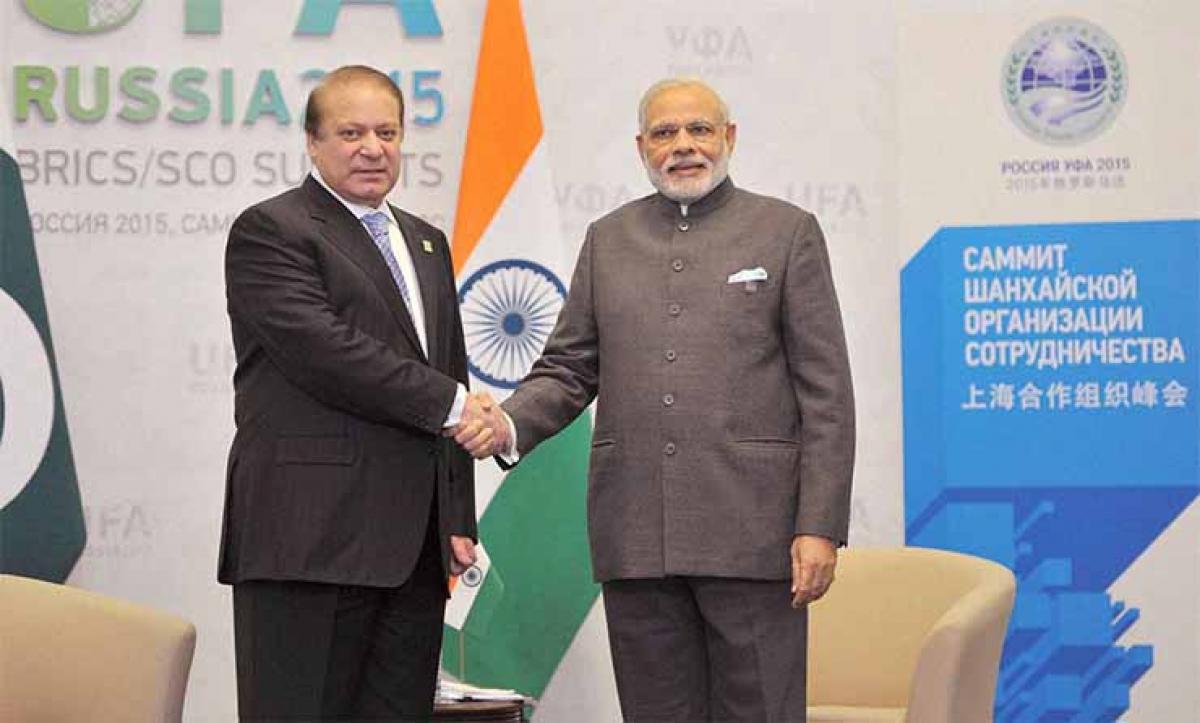Live
- Skill enhancement session organised for school teachers
- Tribal Ashram school girl students fall sick again
- Grand finale of Innovation marathon begins at IIT Tirupati
- Ensure no inconvenience to bus passengers: MLA
- Being overweight surpasses smoking as Australia's leading health risk
- Rush of Devotees at Tirumala normal, to take six hours for darshans
- Thiruvannamalai turns a major revenue earner for RTC
- Development works in Warangal to take off on war-footing: Ponguleti
- Great day for America: Trump welcomes FBI chief's resignation announcement
- SAAP chief for bringing hi-tech into sports
Just In

India and Pakistan on Friday decided to revive the stalled dialogue process and quicken the Mumbai attack case trial in talks between Prime Minister Narendra Modi and his Pakistani counterpart Nawaz Sharif, who came under attack back home on absence of Kashmir issue in the joint statement.
Ufa: India and Pakistan on Friday decided to revive the stalled dialogue process and quicken the Mumbai attack case trial in talks between Prime Minister Narendra Modi and his Pakistani counterpart Nawaz Sharif, who came under attack back home on absence of Kashmir issue in the joint statement.
Modi accepted Sharif's invitation to visit Pakistan next year for the SAARC Summit.Meeting on the sidelines of the Shanghai Cooperation Organisation (SCO) summit, the two leaders decided that National Security Advisers Ajit Doval and Sartaj Aziz will meet in Delhi next month or in September to discuss "all issues connected to terrorism".

The decision is crucial as Aziz is a well-respected person in that country and trusted by the Pakistan Army, sources said, adding he is the right man for the task. The two leaders focused their discussions mainly on terrorism, which India has been projecting as the core issue bedevilling Indo-Pak relations.
Modi and Sharif had held bilateral talks in May last year in New Delhi when the Pakistan Prime Minister came to attend swearing-in ceremony of the Indian leader. They came face-to- face in Kathmandu in November last for the SAARC Summit but only exchanged pleasantries.
Foreign Secretaries of the two countries were to meet in August last year in Islamabad but the talks were cancelled by India which protested the Pakistani envoy in Delhi meeting Kashmiri separatist leaders ahead of the parleys. A one-page joint statement outlining a five-point roadmap issued after the Modi-Sharif meeting said, "Both sides agreed to discuss ways and means to expedite the Mumbai case trial (in Pakistan), including additional information like providing voice samples".
India has been upset over the almost non-existent trial in the 2008 Mumbai attack case, with even the mastermind and LeT operations commander Zakiur Rehman Lakhvi being released by the court as the Pakistan government failed to furnish the required evidence.
The joint statement also spelt out a number of decisions, including early meetings of BSF Director General and his counterpart from Pakistan Rangers followed by that of DGMOs. Significantly, there was no mention of Kashmir in the joint statement or at the joint press briefing by Foreign Secretaries S Jaishankar and Aizaz Ahmad Chaudhry.
In Pakistan, initially there was welcome of the meeting between Modi and his Pakistani counterpart Nawaz Sharif, leaders and media in Pakistan have criticised the government over the absence of any mention of the vexed Kashmir issue in the joint statement. In India, political reaction was mixed. BJP saw a "glimmer of light" in the bilateral relationship while Congress termed it as neither historic nor a breakthrough.
Regional parties had a different take with the ruling PDP and opposition National Conference of Jammu and Kashmir welcoming the dialogue while Shiv Sena did not share its ally BJP's enthusiasm on the issue. Hailing the outcome of the meeting between the two leaders in Ufa, Russia, BJP spokesman M J Akbar said Pakistan has for the first time accepted India's "definition" of terrorism.
For the first time, he said, Pakistan has accepted India's "definition of terrorism that terrorism in all its forms is unacceptable".That is a change from the "nuanced game" Pakistan has played on the subject by differentiating between "good and bad terrorists", he said. He told reporters that it has provided an opportunity to take forward the relationship between the two countries.
However, the joint statement issued after foreign ministerial-level meets in 2011 and 2012 had similar formulations when the two countries agreed to fight and "eliminate in all its forms and manifestations". Modi, who accepted Sharif's invitation to visit Pakistan for the SAARC Summit in 2016, will be the first Indian Prime Minister in 12 years to travel to that country after Prime Minister Atal Bihari Vajpayee's historic visit in January, 2004.
The two leaders agreed that India and Pakistan have collective responsibility to ensure peace and promote development. To do so, they are prepared to discuss all outstanding issues, the statement said.Shah Mehmood Qureshi, former foreign minister and leader of Pakistan Tehreek-i-Insaf (PTI), told Pakistani media that Kashmir should have been mentioned in the joint communique. "It is quite strange that Kashmir has not been part of the statement," he said.
Senator Sehar Kamran, who heads Centre for Pakistan and Gulf Studies (CPGS) think-tank also criticised the joint statement."The statement, only mentions the Mumbai case trial, but fails to highlight the lingering Kashmir dispute which is a lost opportunity to illustrate the destabilising role of India in the region.
In the Joint Statement, India and Pakistan also decided to release fishermen in each other's custody, along with their boats, within a period of 15 days, addressing one of the major humanitarian issues between them. According to the latest list exchanged by the two sides, there were 355 Indian fishermen languishing in Pakistani jails and 27 Pakistani fishermen lodged in Indian jails.The two sides also decided to have a mechanism for facilitating religious tourism.

© 2024 Hyderabad Media House Limited/The Hans India. All rights reserved. Powered by hocalwire.com







